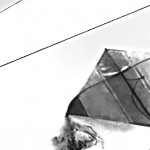Gopal threw down a bunch of scrunched up ten rupee notes on the dirty glass counter. The notes came to rest in the gap between large, even dirtier, glass jars filled with enticing wares and a fair share of flies. There was wrapper-less hard orange candy, small red local chocolates, lollipops with cartoon-cover wrappings and even a jar with stale and very greasy patties.
“Four bantas. And give them four patties as well.” He commanded. “Make sure you give fresh ones. I know all your tricks Baba, you’ll try to pass off your old stale stuff to these kids.”
Baba muttered under his breath and stared at the four young urchins standing grouped together a yard or two behind Gopal. They looked back with uneasy yet hopeful eyes and proceeded to huddle even closer together. They were all wearing blue torn shirts and khaki shorts, their dark, thin legs snaking out and ending in dirty bare feet.
Baba picked up the notes and stretched them out on the counter. Then he took each of them up to the thick lenses of his spectacles, like he was checking for authenticity.
“Baba, there are other shops in this mohalla. If you don’t want the money, there are others who’ll be more than happy to take it. And their food is better than yours anyway.”
Baba hastily kept the money in his till. As he popped the kanchas in the banta bottles with practiced thumb movements, he said in a conciliatory tone, ” Arre, I’m just a small shopkeeper Gopal dada. I have to be careful, no? So many people try to hoodwink me with torn notes, hai na?”
Gopal stared dead-level at Baba. He leaned forward till his face was inches from Baba’s.
“Do you really think I need to cheat you for fifty rupees?” Gopal’s normally cheery voice was ominously low.
“No, no Gopal dada. Not at all. Forget I said anything.”
In reality, Baba was a good friend. They spent many evenings drinking in the little curtained alcove behind Mohan’s bar at the corner of the street, just next to the statue of Shivaji on his horse installed by some local politician or another. On many occasions, when the harsh local hooch managed to cut through his cold veneer, he had saturated Baba’s shirt with his tears of remembrances and regrets. But it was important to use that tone with Baba in front of the new batch of prospects. It instilled awe for him in them. And that always made his job easier.
He remembered when he had just come to this mohalla. Baba would not let his grubby feet within five feet of his shop. The stream of abuse that flew from his mouth when a young Gopal accidentally put his foot in the shop while delivering tea had shocked him into silence. He had never heard that tone, let alone those words, in all his time in his village or even the couple of months he had worked at the dhaba in the next street. After that, he used to look at Baba with awe and fear. One of the things that had most impressed him about Raghu dada was the nonchalant way in which he treated Baba. Of course, as he grew older, he met people who were not just cardboard caricatures of fear put up by the gang to impress young talent. These people had cold blank eyes which you never wanted to see up close. If you did, they were probably was the last things you ever saw.
Gopal gestured to the kids. They seemed reluctant to come close to the shop. They had probably heard abuse from Baba before. But Gopal’s presence emboldened them and they soon started, eyes shining with joy and greed, towards the counter where Baba had set the now kancha-less bottles and a pile of patties on a piece of newspaper.
They grabbed the bantas greedily. They had seen the fizz spewing from the banta bottles many times in other people’s hands. But this was the first time they held the cold, sparkly elixir in their own hands. Huge bites of the patties between gulps of the cold stuff and one could almost see the unexpected joy seeping all the way to their souls. There was a radiant glow on their faces as they tittered in Bhojpuri, joyous toothy grins plastered on their faces. These were possibly the first smiles on their little faces since they ran away from the poverty of their village and snuck into the goods train to Mumbai railway station where they met Gopal.
He looked at them with appraising eyes. Three of them looked fine for the trade. The fourth kid, no, prospect, was a little too short. He may not be able to reach up and display his piteously sad face through the windows of cars waiting at red-light junctions.
As with all things, this trade also had its own secrets. It was important for the kids to look sad and beaten, but it was also important for them to be tall enough to be right in front of the faces of the passengers in the cars. There was no point in having an adorable pity-inducing face if it couldn’t reach the window. Such kids could never get the well-heeled to open the window and throw out coins. And they would miss their daily quotas and suffer the consequences. On the other side of the spectrum were the tall, gangly ones who would tower over the window, scaring the passengers rather than invoking pity. They also faced the consequences of missing their daily quotas.
That’s what had happened to Gopal. He had started off fine, his gentle face ensuring that he met his daily quotas quite easily. But at eleven, a growth spurt made him more scary than pitiable. The glass windows of cars started to remain stubbornly shut and the people inside looked away in distaste. He didn’t understand for some time, but after Raghu dada beat him up for missing his quota yet again one evening, he took pity on Gopal’s confused face. He sat Gopal down at Baba’s shop and told him that he was no longer capable of inducing pity. The people in the cars were not going to drop coins for him anymore. He may get a few from autorickshaw drivers, but that would not be enough. He needed to build other skills.
That’s when Gopal truly came under Raghu dada’s wing. Pickpocketing, minor theft, roughing up detractors, hafta vasooli – Gopal had proved himself in everything in the next three years. Raghu dada also liked the fact that Gopal was not just a fighter – those he had dozens – he could use his brains too. And more importantly, he had a way with children.
Gopal moved into the gang’s most profitable business. For five years, he clawed his way to become Raghu dada’s best recruiter. There was no other recruiter who could win the trust of these kids faster than him. He could cajole and impress. He could also thrash and mutilate. He always made his quota of new kids introduced to the trade, week after week, month after month, year after year.
But Gopal was getting restless now. He had been doing the same thing for years and, admittedly, had a good life in the mohalla. But in the same period, he saw Raghu dada rise from a local dada to an elected ward corporator. Everybody who lived or worked in the area had to grease his palm in some way or the other. His body was no longer wiry as it was when Gopal first met him at the railway station; the easy income had added gentle rolls of fat all around. And the new plump look was just right for an upcoming politician who was dipping all ten fingers in ghee, sometimes quite literally. He still lived in the same mohalla but had acquired two large adjacent houses, just across from Baba’s shop. There was always a queue of people waiting to meet him to get some favours with hope in their eyes and bribes in their pockets.
As the children turned the bottles up and stuck out their pink tongues to catch the last few drops of the cold drink, a white ambassador car snaked up the curving, broken street of their mohalla and came to a stop outside Raghu bhai’s house. A ripple ran through the people waiting to meet him as he opened the door himself. He didn’t look towards the waiting people, but with palms folded he went to the car and opened the door for a white kurta-pyjama clad local politician with a long, broad red tilak on his forehead.
Gopal smiled. The rumours were true. Raghu bhai was being courted by local political parties in time for the next Brihanmumbai Municipal Corporation elections. And it looked like he had made his choice and would join the ruling party.
Gopal wanted to move up too. Maybe take Raghu’s place in the gang now that he had other fish to fry. Maybe become a corporator in a few years. And then, who knows?
But he knew the only way to move to the next level was to make sure he did his current job well. And that meant his weekly quota of new beggars had to be met again this week. He looked at the four kids appraisingly again. The short kid just would just have to do.
Gopal’s eyes became just a little bit blanker.
Swapnil Bhatnagar was born in Delhi and stays in Bangalore where he works in the research and advisory field. His true love lies in the written word and he thoroughly enjoys the creative process of writing short stories. He remains fascinated by the fact that he shares his birthday with his daughter – a wonderful sign of things to come.
His work has previously been published in magazines such as Out of Print and Spark.









Leave a Reply